













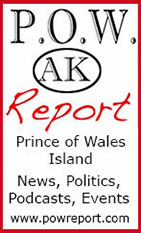

 Contact Contact 
 Webmail
Letters Webmail
Letters
 News Tips News Tips
 Copyright Info Copyright Info
 Archives Archives
Quick News
Search
 Alaska Alaska
 Ketchikan Ketchikan
 SE Alaska SE Alaska
Columns
- Articles
 Dave Kiffer Dave Kiffer
 Money Matters Money Matters
Historical
Ketchikan
 June Allen June Allen
 Dave
Kiffer Dave
Kiffer
 Louise
B. Harrington Louise
B. Harrington
Sports
 Ketchikan Links Ketchikan Links
Public Records
 FAA Accident Reports FAA Accident Reports
 NTSB
Accident Reports NTSB
Accident Reports
 Court Calendar Court Calendar
 Recent Filings & Case Dispositions Recent Filings & Case Dispositions
 Court Records Search Court Records Search
 Sex Offender Reg. Sex Offender Reg.
 Public Notices Public Notices
 Alaska Recall Alerts Alaska Recall Alerts
 Recalls.gov Recalls.gov
 AST Daily Dispatch AST Daily Dispatch
 KTN
Police Reports KTN
Police Reports
 Juneau Police Reports Juneau Police Reports
Weather,
Webcams
 Today's
Forecast Today's
Forecast
 KTN
Weather Data KTN
Weather Data
 AK
Weather Map AK
Weather Map
 AK Weathercams AK Weathercams
 AK Earthquakes AK Earthquakes

|
|

Tuesday
March 15, 2022
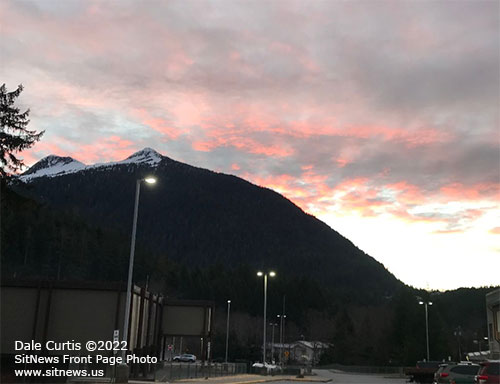
Deer Mountain Sunrise
SitNews Front Page Photo by DALE CURTIS ©2022
To have your photo(s) featured on the front page,
email your photo(s) to editor@sitnews.us |
KETCHIKAN: State negotiating with Ketchikan dock owners to turn Malaspina ferry into museum - One of the first Alaska Marine Highway vessels could be reborn nearly 60 years later as a museum for the history of the state ferry system. State transportation authorities announced Monday that they’d entered negotiations to sell the ferry Malaspina to the owners of a private cruise ship dock in Ketchikan’s Ward Cove. - By ERIC STONE, KRBD www.krbd.org - More....
 COVID-19 DATA SUMMARY – Mar. 14, 2022 -Reporting data for Mar. 11- Mar. 13, 2022: COVID-19 DATA SUMMARY – Mar. 14, 2022 -Reporting data for Mar. 11- Mar. 13, 2022:
OVERVIEW – Statewide 511 new cases - 0 deaths* - 51 hospitalizations - Statewide alert dlevel: high - 59.4% of Alaskans 5+ vaccinated
SE Alaska Positive Cases: Ketchikan (12), Metlakatla (1), Craig (1)
 COVID-19 DATA SUMMARY COVID-19 DATA SUMMARY
March 11, 2022 Reporting data for March 9-10, 2022
 COVID-19 DATA SUMMARYReporting data for Mar. 2 - Mar. 3, 2022 COVID-19 DATA SUMMARYReporting data for Mar. 2 - Mar. 3, 2022
 COVID-19 Updates March (Scroll down for most recent.) COVID-19 Updates March (Scroll down for most recent.)
 Alert Levels Alert Levels
 Case Counts Dashboard Case Counts Dashboard
 Information Hub Information Hub
 Alaska: Statewide COVID-19 Alert Levels, Updates, Active Cases, Hospitalizations, etc. Alaska: Statewide COVID-19 Alert Levels, Updates, Active Cases, Hospitalizations, etc.
Ketchikan: Public Meetings
Ketchikan: Upcoming Events
Ketchikan: Announcements
Ketchikan: Classifieds
Historical
Ketchikan
 June Allen June Allen
 Dave
Kiffer Dave
Kiffer
 Louise
B. Harrington Louise
B. Harrington
Ketchikan Weather
 Ketchikan's
Forecast Ketchikan's
Forecast
 Ketchikan Dec. Weather Ketchikan Dec. Weather
 Ketchikan 2021 Daily & Monthly Data (Choose the Location of Interest) Ketchikan 2021 Daily & Monthly Data (Choose the Location of Interest)
 Nat Weather Service KTN Nat Weather Service KTN
 Ketchikan Tides & Currents Ketchikan Tides & Currents
 Tideschart Tideschart
 Sunrise - Sunset Ketchikan Sunrise - Sunset Ketchikan
Search the News
 Ketchikan Ketchikan
 Alaska Alaska
 SitNews Search SitNews Search
|
Fish Factor: One of Alaska’s most troubling fishing issues: bycatch By LAINE WELCH - Gotta give the Dunleavy Administration credit for being the first to try and get to the bottom of one of Alaska’s most troubling fishing issues: bycatch.
The governor in November 2021 created an Alaska Bycatch Review Task Force (ABRT) “to help better understand unintended bycatch of high value fishery resources in State and federal waters.”
He defined bycatch as “fish which are harvested in a fishery but are not sold or kept.”
The 13-member group will issue a final report based on those better understandings in November 2022.
"Once the structure of the taskforce is framed, it will be a good road map of how we can incorporate everyday Alaskans' voices into the decision-making process," said Commissioner Doug Vincent-Lang in announcing the ABRT, "because they are the owners of these resources."
Since January the ABRT has met online three times and formed four committees and sub-committees focusing on 1) science, technology, and innovation; 2) Western Alaska salmon; 3) Bering Sea and Gulf of Alaska crab, and 4) Gulf of Alaska halibut and salmon.
A new public page launched last week at the Alaska Dept. of Fish and Game’s home site includes the agendas, minutes and audio from all meetings. The reference library also provides presentations by state and federal managers and an overview of genetic stock identification of salmon taken as bycatch in Alaska’s groundfish fisheries.
All fisheries are plagued by accidental takes of unwanted species, due to size or being out of season or on a fishing gear’s ‘can’t catch’ list. It includes multi-millions of tons of fish and crab that are required by law to be discarded every year.
There is no denying that the trawl sector bears the brunt of the bycatch burden. There is no denying they hate tossing fish over the side as much as any other fisherman.
Alaskan have been angry and frustrated by the federally required waste for decades, but it took last summer’s shutdown of the Yukon subsistence chum salmon fishery to really get people’s attention.
While village smokehouses and freezers stayed empty, trawlers had no limits on their chum bycatch and went about business as usual.
“We have to communicate directly with affected communities,” said ABRT member Senator Peter Micciche (R-Soldotna) at the March 9 meeting. “That's something we have to think about as we develop a product - how we're going to have two way communications with the folks that have gotten us to this point where we have a bycatch working group in the first place.”
Providing information that “Everyday Alaskans” can understand is critical, said ABRT vice-chair Tommy Sheridan.
“How can Bering Sea and Aleutian Islands and Gulf of Alaska bycatch reports be more readily available and simplified for public review and understanding?” he said as an example.
Sincerely, good luck with that.
Federal catch accounting is easily available and impressively inclusive. But the data and reports contain a befuddling mishmash of metrics, acronyms and descriptions that are tough to interpret, like this definition:
“Bycatch = Discarded fish. Economic discards: fish harvested which could be legally retained, but are of insufficient value to retain. Regulatory discards: fish harvested which are required by regulation to be discarded whenever caught, or are required by regulation to be retained but not sold. Prohibited Species Catch (PSC): A special type of regulatory discard that must be returned to sea with a minimum of injury = Pacific halibut, herring, salmon, steelhead, king crab, bairdi, opilio crab.”
At least two “listening sessions” are planned “where all we do is take public comments,” said ABTR member Stephanie Madsen, director of the At-Sea Processors Association.
The “owners of these resources” will be “incorporating their voices” and asking lots of questions.
Why, for example, are crab considered as PSC in the Bering Sea but not in the Gulf?
And why do managers use a different mix of crab numbers and pounds that don’t add up in bycatch reports?
Why are “other salmon” (chum) considered as PSC, but have no assigned caps?
If a PSC cap is reached, managers say a fishery will be shut down. But when Bering Sea trawlers neared their herring cap in 2020, it was quickly doubled by emergency action.
Why were trawlers allowed to exceed their sablefish bycatch limits by 356% and 484% in back to back years, topping 11 million pounds?
What are PSQ and CDQ and COBLZ in weekly bycatch updates?
And why is there almost no public information or data on bycatch in state fisheries (out to three miles)?
Member Brian Gabriel, City of Kenai mayor, stressed at the meeting that “this work group was formed because of public outrage at things that may or may not be accurate.”
“We're going to spend some time over the next several months providing information that's more accurate on what's actually going on and some possible solutions,” Gabriel added. “If we don't have a way of getting information out, what we're doing will have very little value to the folks that are the most concerned." - More...
Tuesday PM - March 15, 2022
|
|
Alaska: Alaska Department of Revenue releases Spring 2022 Revenue Forecast Posted & Edited By MARY KAUFFMAN - Alaska Department of Revenue (DOR) Commissioner Lucinda Mahoney released the Spring 2022 Revenue Forecast today. The Revenue Forecast includes the Department’s spring forecast of oil price, oil production, and state revenue.
Unrestricted General Fund (UGF) revenue, before accounting for the transfer from the Permanent Fund Earnings Reserve, is forecast to be $3.9 billion in fiscal year (FY) 2022 and $5.0 billion in FY 2023.
The Permanent Fund is expected to transfer $3.1 billion to the General Fund in FY 2022 and $3.4 billion in FY 2023. These amounts include funds that are available for general government spending and the payment of dividends. With continued growth of the fund, the Permanent Fund transfer remains a large source of UGF revenue, contributing 65% of UGF in FY 2021 and projected to contribute in the range of 40% to 62% in each of the next ten years.
For FY 2021, Alaska North Slope (ANS) oil prices averaged $54.14 per barrel. The revenue forecast incorporates the most current indications from financial markets and is based on an annual average ANS oil price of $91.68 per barrel for FY 2022 and $101.00 per barrel for FY 2023. Prices are expected to decline beyond FY 2023, stabilizing at $77.00 per barrel by FY 2031.
For FY 2021, ANS oil production averaged 486,100 barrels per day. ANS oil production is expected to average 481,800 barrels per day in FY 2022 and 502,300 barrels per day in FY 2023, before climbing to 576,600 barrels per day by FY 2031. - More...
Tuesday PM - March 15, 2022
Alaska: Sen. Kawasaki To Host a PFD Debate With Sen. Shower, Rep. Kreiss-Tomkins, Larry Persily, and Joe Geldhof - Senator Scott Kawasaki (D- Fairbanks) will host a PFD Debate on Saturday, March 19, 2022, from 6:30 p.m. to 8:00 p.m. The debate participants are Senator Mike Shower (R-Mat-Su Valley), Representative Jonathon Kreiss-Tomkins (D-Sitka), Larry Persily, former Deputy Commissioner of the Department of Revenue, and Joe Geldhof with the Permanent Fund Defenders.
“The Permanent Fund and specifically the size of the Permanent Fund Dividend has been the hot button political issue for most of the previous decade,” said Sen. Kawasaki. “While there have been many hours of committee hearings and discussion about the size of the dividend, we wanted to bring the debate directly to Alaskans. I think it is important Alaskans to hear both sides of the argument surrounding the PFD, and I am excited for the opportunity to have the discussion.”
Senator Kawasaki will moderate the debate and take questions from viewers. Those wanting to ask questions can either write them in the comment section during the livestream or email them to Sen.Scott.Kawasaki@akleg.gov .
“I would like to thank all the panelists for agreeing to participate in this debate and also the Permanent Fund Defenders for coming to me with this idea and allowing me to facilitate the debate,” concluded Sen. Kawasaki. - More...
Tuesday PM - March 15, 2022
Alaska: Alaska Senate Passes SJR 12: Urges Congress ’ to Repeal the Windfall Elimination Provision (WEP) and Government Pension Offset (GPO) POSTED & EDITED BY MARY KAUFFMAN - Senate Joint Resolution 12 urging Congress to repeal the Windfall Elimination Provision (WEP) and Government Pension Offset (GPO) of the Social Security Act unanimously passed the Alaska Senate on Friday.
The WEP cuts the Social Security benefits of public employees in Alaska if they switch between work in the public sector and private sector or the military. In 2021, this loss could be as much as $498 per month, or about $6,000 a year. The GPO cuts spousal or widows’ benefits for public employees for no reason other than their work time in the public sector. This cut could amount to as much as 2/3rds the value of the individual’s government pension.
Because Alaska is one of few states that no longer provides a defined benefit plan and does not offset coverage by Social Security, the WEP and GPO affect more Alaskans per capita than in any other state. Public employees in Alaska are essentially punished for choosing to work in public service.
The WEP and GPO negatively impact the recruitment and retention of Alaska public employees like firefighters, police officers, and teachers. Those who do not want to be subject to these provisions will simply look elsewhere for employment.
Quoting a news letter published by Senator Bill Wielechowski (D-Anchorage), punishing individuals for choosing public service runs counter to retaining dedicated Alaskan workers and recruiting the best of the best to and within Alaska. Passage of SJR 12 will demonstrate that the Alaska Legislature opposes arbitrary and unfair cuts to the rightfully earned Social Security benefits of Alaskans. - More...
Tuesday PM - March 15, 2022 |
|
Alaska - Nationwide: Russian Seafood Ban Announced Posted & Edited By MARY KAUFFMAN - President Joe Biden signed an executive order on March 11th to prohibit the importation of Russian seafood and other key imports into the United States.
U.S. Senator Dan Sullivan (R-Alaska) applauded the announcement by President Biden that his administration will prohibit the importation of Russian seafood into the United States, in addition to banning goods from several other signature sectors of Russia’s economy. Sullivan has been working to ban the hundreds of millions of dollars’ worth of Russian seafood that the U.S. imports every year since he came to the Senate in 2015, including introducing the U.S-Russian Federation Seafood Reciprocity Act with Sen. Lisa Murkowski (R-Alaska) on February 9.
President Biden also announced his intention to revoke Russia’s “most-favored nation” status as a member of the World Trade Organization. Sen. Sullivan called for this sanction on Saturday, March 5, after hearing from Ukrainian President Volodymyr Zelensky in a congressional Zoom meeting.
Since Russia imposed seafood bans on the United States in 2014, Senator Murkowski has worked to educate every President and their administration on the importance of re-opening the Russian market to U.S. seafood and failing that, creating a reciprocal ban on Russian seafood. Murkowski’s latest effort on this front was to introduce the U.S-Russian Federation Seafood Reciprocity Actwith Senator Dan Sullivan (R-AK), which would impose a ban on the import of all Russian seafood products into the United States.
“I appreciate and strongly support the announcement by President Biden today that the United States will ban the importation of Russian seafood,” said Sen. Sullivan. “I’ve been advocating for such a move by our federal government through legislation and advocacy with top Cabinet officials during the Obama, Trump and Biden administrations. Just in the past few weeks, I’ve had detailed discussions with President Biden’s National Security Advisor and U.S. Trade Representative on this important topic—including just yesterday.
“Although this unfair and non-reciprocal seafood trade relationship between the United States and the Russian Federation has been harming our fishermen for far too long, I appreciate that the Biden administration has recognized the need to rectify it, and support the thousands of hard-working fishermen across the country and in Alaska.”
On February 15, 2022, Senator Murkowski spoke on the Senate floor, calling for a ban on Russian seafood, as well as Russian energy imports, to be included as part of any Russia sanctions package. Less than one month later, the President has prohibited importation of both.
“President Biden’s executive order banning Russian seafood imports is long overdue, but incredibly welcome news. As I have told his administration—and every administration since 2014 - Russia’s dealings in seafood are inequitable and unacceptable. Russia has been closed to U.S seafood, yet their product continues to be sold widely within our markets. For far too long, we have been rewarding their bad behavior,” said Senator Murkowski.
Murkowski said, “In Alaska, where we produce more than 60 percent of U.S. seafood, Russia competes directly with some of our most valuable species, such as salmon, crab, and Pollock, using inferior sustainability and processing practices. U.S. fishermen and women and America’s economy deserve a level playing field. While I wish we’d taken this step eight years ago at my initial urging, I thank the administration and welcome the relief this will bring our harvesters and processors.”
Congressman Don Young (R-AK) said in a prepared statement, "I've spent weeks calling for a Russian seafood ban, and I'm pleased to see President Biden following my lead and taking action. A ban is a crucially important move, which is why I've been advocating so strongly for it among my colleagues in Congress. This is a harrowing moment in Europe. Vladimir Putin and his cronies continue reigning down terror upon Ukrainians. As dictators do, he's using Russia's economy as a piggybank to subvert freedom and kill innocent people. This is why we must sanction every sector of his economy to bleed his war machine dry. I will continue pushing my legislation to ban Russian seafood imports either as a standalone bill or as part of a broader sanctions package. America is unified behind Ukraine, and I call on my colleagues to forge urgent consensus on a sanctions effort that hits Putin where it hurts and sends a message of zero tolerance for his aggression."
“Crabbers are pleased to see the President’s swift action to ban US imports of Russian seafood with this Executive Order and thank the Alaska delegation for their leadership in highlighting this issue. This ban will provide an economic pinch to Russia that, for example with crab, cuts off nearly a billion dollars’ worth of crab coming into the US from Russia annually. At the same time, this ban provides an opportunity to increase consumer awareness about where seafood comes from and, hopefully, improve labeling and traceability to the benefit of sustainably harvested US seafood. For crab, while we need imports from other countries, like Canada and Norway, to meet the US demand, we want consumers to be able to choose premier crab from Alaska’s pristine waters,” said Jamie Goen, Executive Director, Alaska Bering Sea Crabbers. - More...
Tuesday PM - March 15, 2022 |
|
Alaska: The Brown Bears of Bristol Bay and Alaska Peninsula By BJORN DIHLE - In 2019, a young fisherman was walking through a boatyard in Naknek, Bristol Bay, when he bumped into a brown bear feeding from a dumpster. It was night, when, bears are most active and bold — especially around human activity. The man ran and, moments later, was knocked down by the bear. Though the bear bit his calf, the man fought back and managed to break free. The bear nipped him one last time on the butt before he was able to climb to safety on his father’s boat. The Alaska Department of Fish & Game and Alaska State Wildlife Troopers were notified, and two juvenile bears were killed near the location of the attack.
Living with bears isn’t easy but, for folks in Bristol Bay and the Alaska Peninsula, it’s a fact of everyday life. The biggest problem communities face, according to Dillingham’s Animal Control Officer Dan Boyd — and as the above story highlights — is poorly stored garbage. A bear that becomes habituated to eating trash is much more likely to lose its fear of people than a “wild” bear.
The population of Bristol Bay and Alaska Peninsula makes up about one third of Alaska’s entire brown bear population, which the Alaska Department of Fish and Game (ADFG) estimates to be around 30,000. The east side of Bristol Bay butts up against world renowned bear-viewing mecca Katmai National Park, which has an estimated 2,220 brown bears. Unit 9, which encompasses most of Bristol Bay and the Alaska Peninsula outside of Katmai, which juts out to the southwest, has an estimated 6,000-6,800 bears. The northwest portion of Bristol Bay is encompassed by the Togiak Wildlife Refuge. Bears here are not as plentiful, nor do they grow as large. A population estimate for the Togiak refuge and some nearby areas put the brown bear population between 642 and 928.
One September, when I was in King Salmon, the proprietor of the Antlers Inn warned me to not walk the nearby street at night. Bears, she said, use it every night coming to and from the river. I ran into a number of parties from around the world who had traveled to the small Bristol Bay community to see and photograph bears. Just a short floatplane flight from King Salmon is Brooks Camp and the famed Brooks Falls, the most visited bear viewing area in Alaska. Brooks Camp is managed by a team of park rangers who make sure bears and people coexist as peacefully and respectfully as possible. It is incredibly rare, despite bears and people often being in close proximity, for contact between bear and person to be made at Brooks Camp. One of the key factors for Brooks Camp’s success avoiding negative interactions between bears and people is that human food and garbage is kept on lockdown.
Brooks Falls also acts as the setting for the international celebrated Fat Bear Week, where people get to tune in virtually to Brooks Falls, judge which individual bear is the “portly patriarch of paunch” or “king of the capacious creatures of Katmai” — i.e. fattest — and cast their vote online. The competition has become increasingly popular and provides a way to educate people on the natural history of Katmai bears, the value of salmon and the interconnectedness of the ecosystem. A University of Alaska study put bear viewing in Southcentral Alaska, which includes Katmai as well as other portions of Cook Inlet, as annually generating around $35 million. - More...
Tuesday PM - March 15, 2022
|

A tale of two salmon
By MARY CATHARINE MARTIN
Chignik
Photo by J. Stephen Conn. Creative Commons license. |
|
Alaska: A tale of two salmon - Bristol Bay’s sockeye run began breaking records in 2018. The same year, Chignik, which is on the other side of the Alaska Peninsula, failed to meet its minimum escapements for the first time in recent memory. Now, Chignik’s residents and fishermen are working to address and bring attention to these unprecedented declines, and to save their way of life. By MARY CATHARINE MARTIN - Axel Kopun and George Anderson have fond memories of the Chignik purse seine fishery’s heyday. Once, Kopun was on a boat hauling in a purse seine so full of sockeye salmon that the corks holding the net up started to sink. Fish were jumping out of it. And one of the crew members jumped right into the net seething with salmon to hold up the corks and keep fish in.
In 2018, however, Chignik’s fishermen were left with no salmon in their nets or fish in their smokehouses.
Chignik has two genetically distinct runs of sockeye: one early, one late. That year, for the first time in Elders’ memory, both failed to meet their minimum escapement goals. Local salmon fishermen, both commercial and subsistence, were unable to fish. People in the five villages that make up “the Chigniks” scrambled to respond, creating the Chignik Intertribal Coalition.
“The formation of the coalition was to make sure people had food in their freezers to feed their family that first year,” said Anderson, who serves as coalition president. “In my lifetime, it was the first time when we did not meet minimum escapement or were able to go subsistence fishing. Everyone was really in shock. We didn’t know where to turn. With our food security destroyed, that gave us a pretty clear direction to stabilize food security for our families. It went beyond economic viability.”
Since 2018, every early run has failed, and multiple late runs as well. Commercial fisheries have opened only rarely. There have been federal subsistence closures for both sockeye and Chinook almost every year since 2018. In 2020, instead of harvesting salmon with his granddaughter, Anderson was driving to the airport with her, to help pick up Bristol Bay salmon donated by Northline Seafoods through the Alaska Sustainable Fisheries Trust’s Seafood Donation Program.
Though he and everyone else in Chignik was grateful for the donation, “a part of me was sad,” he said. “I thought it was ironic. Here I am, teaching my granddaughter how to pick up fish at the runway donated from another area, instead of how and where to catch salmon in our home area.”
Just as in the Arctic, Yukon and Kuskokwim regions, salmon failures impact much more than fishermen’s bottom lines.
“Salmon is pretty much everything,” Kopun said. “We eat it every way possible. My whole family. My friends, their families, my aunts, uncles, cousins – everybody in Chignik. You smoke it, salt it, dry it, freeze it for the winter, can it. Salmon puts food on the table, literally and figuratively. We eat them and we make money to buy all of the other stuff. Salmon puts a roof over our head.” - More...
Tuesday PM - March 15, 2022
ANALYSIS: Oil price shocks have a long history, but today’s situation may be the most complex ever By SCOTT L. MONTGOMERY - The world is in the grip of an oil price shock. In just a few months, prices have risen from US$65 a barrel to over $130, causing fuel costs to surge, inflationary pressure to rise and consumer tempers to flare. Even before Russia’s invasion of Ukraine, prices were climbing rapidly because of roaring demand and limited supply growth.
Price shocks aren’t new. Viewed historically, they are an integral part of oil market dynamics, not anomalies. They have occurred since the birth of the industry.
Many factors can trigger oil price shocks. They include large shifts in either demand or supply anywhere in the world, since oil is a global commodity. Shocks can also result from war and revolution; periods of rapid economic growth in major importing nations; and domestic problems in supplier countries, such as political conflict or lack of investment in the oil industry. Overall, the worst spikes have combined two or more of these factors – and that’s the situation today.
50 years of ups and downs
Global oil production began in the mid-1800s and grew rapidly in the first half of the 20th century. For much of that time, oil majors – companies like Chevron, Amoco and Mobil that were created after the Supreme Court ordered the breakup of Standard Oil in 1911 – operated effectively as a cartel, maintaining production at levels that kept oil abundant and cheap to encourage its consumption.
This ended when Iran, Iraq, Kuwait, Saudi Arabia and Venezuela formed the Organization of Petroleum Exporting Countries in 1960, nationalizing their oil reserves and gaining real supply power. Over the following decades, other nations in the Middle East, Asia, Africa and Latin America joined – some temporarily, others permanently. - More...
Tuesday PM - March 15, 2022
|
DAVE KIFFER: Ticking, but not kicking, the bucket! - Some people will go to great lengths to cross things off their bucket lists.
We all have bucket lists, you know, things we want to do before we actually "kick the bucket."
As I get older - and find myself kicking a lot more things, especially in hallway in the dark - I realize that I will never stand on top of Mount Everest.
I will not likely make it to the South Pole.
I probably won't drink a papa doble in the El Floridita in Havana.
I will not win the Nobel Prize in Literature.
Nor will I even win that lottery that's gonna change my life and that of every third, fourth, fifth and sixth cousin that I have never met.
But recently, I did manage to check two lesser things off my bucket list. - More...
Tuesday PM - March 15, 2022
TOM PURCELL: A WORLD IN NEED OF IRISH WIT AND WISDOM - With the world full of angst and disruption — with so many people filled with anger and hate — I can’t think of a better time to embrace the Irish spirit.
So let me share some of Ireland’s most enjoyable blessings, proverbs and quotes, as gathered by IrishCentral.
This blessing is a good place to start:
May you have warm words on a cold evening,
a full moon on a dark night,
and the road downhill all the way to your door.
I wish everyone could enjoy warm words on a cold night and an easy, well-lighted walk home, but too many of our fellow human beings are facing incredible burdens and challenges.
The besieged people of Ukraine have experienced far too much war in their long history, and we are all praying that the horrific bloodshed taking place right now ends immediately — but Putin’s actions are making it harder to embrace this Irish thought: - More...
Tuesday PM - March 15, 2022
FINANCIAL FOCUS: Use your financial strategy like GPS Provided By BEN EDWARDS, AAMS® - When you’re driving these days, it’s pretty hard to get lost because your smartphone’s Global Positioning System (GPS) can get you just about anywhere. And as an investor, you can have a similar experience by employing another directional tool – a personalized financial strategy.
Let’s look at the parallels between your GPS and this type of strategy.
To begin with, your GPS pinpoints your exact location at the start of your trip – in other words, it tells you where you are. And when you create a financial strategy, your first step is to evaluate your current situation by answering these types of questions: What are your assets?
How much do you earn? How much do you owe? How much are you contributing to your IRA, 401(k) or other retirement accounts? Once you’ve got a clear picture of your finances, you’ll be ready to begin your journey toward your long-term goals. - More...
Tuesday PM - March 15, 2022
|
POLITICAL CARTOONS

Political Cartoon: Biden Bans Russian Oil
by Jeff Koterba©2022, patreon.com/jeffreykoterba
Distributed to subscribers for publication by CagleCartoons.com

Political Cartoon: Begging OPEC
by Rivers©2022, CagleCartoons.com
Distributed to subscribers for publication by CagleCartoons.com
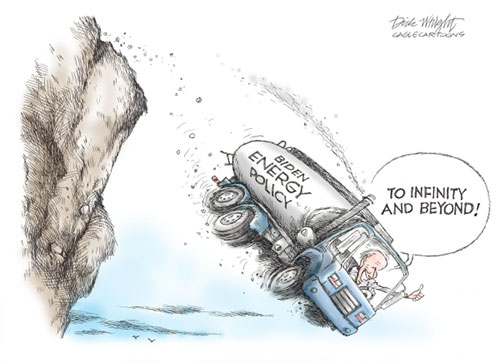
Political Cartoon: Biden Energy Policy Crashing
by Dick Wright©2022, PoliticalCartoons.com
D
istributed to subscribers for publication by CagleCartoons.com
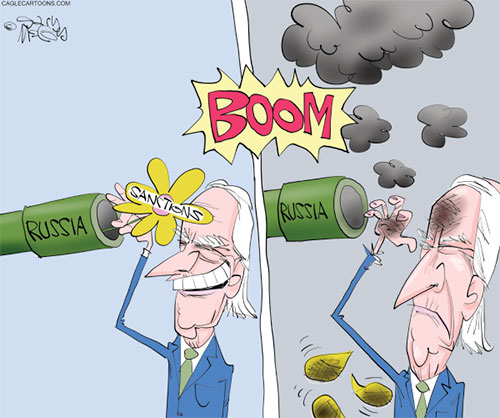
Political Cartoon: Biden Fails Peace
by Gary McCoy, Shiloh, IL
Distributed to subscribers for publication by CagleCartoons.com

Political Cartoon: The Daily Show With Volodymyr Zelenskyy
by R.J. Matson©2022, CQ Roll Call
Distributed to subscribers for publication by CagleCartoons.com
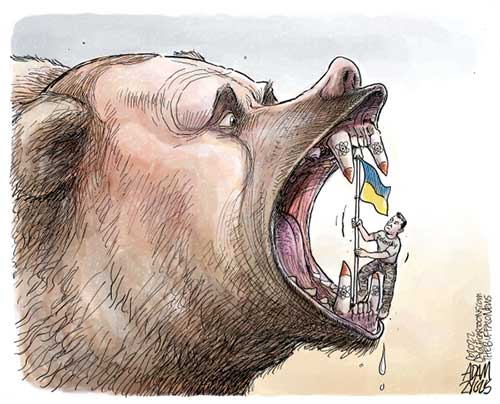
Political Cartoon: Ukraine Resistance
by Adam Zyglis©2022, The Buffalo News, NY
Distributed to subscribers for publication by CagleCartoons.com

Political Cartoon: Understanding the war
by Dave Whamond©2022, Canada, PoliticalCartoons.com
Distributed to subscribers for publication by CagleCartoons.com |
Politics
By A. M. Johnson
- To this point related to politics I have been somewhat successful in keeping the stress level below mind blowing. No need to re-counter the obvious amateur hour that Washington D.C. has presented to the world in this past and current year. Perhaps the accumulation of the out of control is best demonstrated by the following video...
The saddest part of what will be a normal reaction to the content begs the question: "Where is the similar outrage by our Alaska contingent??" Nothing, zip, Nata, proving once again that Alaska Congressional representatives "Go along to Get along".
So disgusted and outraged at how the government is being run and the debt that is being created by those that have no fiscal conception on the damage to the lives and standard of living of our Great Grand children . Let me repeat an old Middle East proverb, a simple lesson in fiscal economic... More...
Tuesday PM - March 15, 2022
Another parent complaining or a problem of Nepotism in school sports programs? By Steven Booth
- Just another parent complaining about their child’s playing time or is it a problem of Nepotism in school sports programs?
The prohibition of nepotism is a common rule in many organizations for good reason. Nepotism has been defined as a form of favoritism, which is granted to relatives in various fields, including business, politics, entertainment, sports, and other activities. Nepotism in youth sports seems to be a field in which there are few recommended policies or regulations.
Non-interscholastic youth sports programs like KDL rely on volunteers, and it is difficult to find coaches with the interest in coaching unless they have a child in the program. This is understandable; however, these situations are not without many parents complaining about the disparate playing time the coach’s child is getting over their child, regardless of the player’s skill level.
High School coaches are under contract to the School District, certified by ASAA, and the stakes are higher when youth are in competition not only on the court but also for scholarships that affect future educational opportunities. With these huge financial benefits, there are incentives to take an advantage by using their position as coach/teacher and artificially elevate their child’s status. This is where the appearances of corruption gain their roots.
When these problems become obvious parents start to talk, gossip and plot, yet, parents fear confrontation or fear retaliation towards their child in the form of either deliberate or subliminal resentment and, as expected, there is a decrease in trust, morale and commitment from unrelated players. “There is no ladder to climb when the top rung is reserved for people with a certain name." - More...
Monday PM - March 07, 2022
ABOUT THOSE –ISMs AGAIN By David G Hanger
- Tucker Snarlson is either a very stupid person or he thinks his audience is a collection of knuckleheads. Maybe he just likes calling the kettle black.
A left-winger cannot possibly be a fascist for the simple reason that fascism is an extreme right wing political philiosophy, and as a charter member of the Joseph Goebbels School of Journalism Tucker Snarlson is in fact a deep-fried fascist propagandist who as recently as yesterday expressed his love and devotion for Vladolf Putrid.
From left to right then, since we read in that direction, we have ‘communism,’ ‘socialism,’ ‘liberalism,’ ‘progressivism,’ ‘classic liberalism,’ ‘conservatism,’ and ‘fascism.’ And as with the Christian religion there are numerous sects and sub-sects of all of these –isms. Nazi-ism is the Hitlerian German version of fascism, and it is safe to say if you call someone a fascist, you are in fact calling them a nazi.
So if you want to insult a so-called leftie you call them a Commie, a Pinko, or a Socialist. The extreme right wing is where Nazis live, and it is no surprise that Tucker Snarlson is employed by an Australian Nazi named Rupert Murdoch. If you want to claim the label, you must also wear it. Tucker Snarlson is a fascist.
This whole concept of left and right is pretty stupid. It originates in the early stages of the French Revolution when Louis XVI finally acquiesced to the seating of a legislature. The royalists all sat to the right of the podium while the commoners and the revolutionaries of multiple persuasions sat to the left of the podium. - More...
Monday PM - March 07, 2022
When will the Russians decide to take back Alaska? By John Suter
Everyone in the world by now sees what the Russians are doing to the Ukrainians. The Ukrainians can either submit to Russian rule or have their cities pounded into sand.
What country will the Russians take over next? That country will have to make a choice. Submit to Russian rule or have their cities pounded into sand. - More...
Monday PM - March 07, 2022
AMHS TO PRINCE RUPERT - SENATE BILL 170
By Mary Lynne Dahl
- Heads up, Southeast Alaska! The House and Senate of the State of Alaska are considering a bill to reform and fund our Alaska Marine Highway System. The details are currently being considered, argued and lobbied for and against, as usual. The legislation is labeled Senate Bill (SB) 170.
Unfortunately, reform of the AMHS has been a topic of discussion in the Alaska legislature for about 40 years, without ever resulting in a satisfactory plan of action to fix the many problems in our ferry system. AMHS is so mismanaged and underfunded now that it is on the verge of a permanent collapse. This current discussion on SB 170 may be the last chance we have to save the ferry system that Southeast Alaska so desperately needs to survive and grow. - More...
Wednesday AM - March 02, 2022
 |
2022 Southeast Conference Mid-Session
By Austin Otos
- The Ketchikan Gateway Borough recently traveled to Juneau for the Southeast Conference Mid-Session. This is an economic summit designed to highlight the growth of Southeast Alaska. Several local organizations strongly represented Ketchikan at the event, including: Alaska Marine Lines, Tessa Axelson (Alaska Forest Association), Tongass Federal Credit Union, Deborah Hayden (economic developer), Ketchikan Indian Community, Ward Cove Group, Julie Sande (Commissioner, Alaska Department of Commerce), and Jack Finnegan (Spruce Root Grant recipient). Many entities from our community attend the conference in order to advocate for economic development. - More...
Wednesday AM - March 02, 2022
 |
Forces Into Western Ukraine By Donald Moskowitz - Since the Russians are essentially occupying eastern Ukraine, and are attacking Kyiv from the north, east and south, maybe NATO military forces with U.S. support should move into western Ukraine to prevent Russia from completely overrunning Ukraine. Air cover would have to be provided for the ground forces.
This would allow Ukrainian civilians to remain in Ukraine, and it could provide an alternate Ukrainian government seat of power if Kyiv is taken by the Russians. The presence of NATO and U.S. military forces in western Ukraine would also provide leverage to get the Russians out of eastern Ukraine since NATO and the U.S. could agree to pull its forces out of western Ukraine as part of a negotiated settlement. - More...
Wednesday AM - March 02, 2022
KETCHIKAN ROADS? By David G Hanger
- There’s an old saying from down south that you can tell how corrupt a county is by the condition of its roads.
Road maintenance and replacement is a routine problem that requires scheduling, planning, and budgeting to pay for it. Here only when it reaches the point of crisis is it even considered, if then. Fire this bunch of worthless morons who cannot maintain the infrastructure they are paid to manage rather than letting it go to hell, and kick the worthless elected officials playing ‘pretend’ right out the door after them. - More...
Monday AM - February 28, 2022
 |
Alaska’s Students Must Learn to “Read by Nine” Now – Not in Nine Years By Quinn Townsend, Bethany Marcum, Kymyona Burk, and Madeleine Ashour
- An entire decade. That’s how long Alaska’s public schools have ranked in the bottom five states for fourth-grade reading, regardless of income level. The pandemic has only exacerbated the struggles of Alaska’s students. All of our children deserve the best lives possible, and they need to be strong readers to succeed in today’s world. Regrettably, Alaska’s public schools are failing to teach our children to read.
Learning to read before the age of nine (typically fourth grade) is imperative for our children. If we fail to prioritize learning to read, so that our children can read to learn, long-term implications on our economy and the fabric of Alaska are unavoidable. Students who cannot read by the end of the third grade are four times more likely to drop out of high school; high school dropouts make up 75 percent of citizens receiving food stamps and 90 percent of the Americans on welfare. Nearly 85 percent of teenagers in the juvenile justice system cannot read to learn and seven out of ten adult prisoners cannot read above a fourth-grade level.
Some in Alaska simply call for more education funding. But Alaska already spends more per capita on education than the majority of states. Look what that money has paid for – the bottom of the educational barrel, so to speak. Clearly, throwing more money at public schools is not the answer.
A strong reading initiative, such as Read by Nine, could make the difference. Read by Nine starts by ensuring kindergartners know the ABCs and the sounds they make. Throughout early elementary school, teachers continue this focus and rely on research-based methods, until by third grade each student can read with ease, understand the material and think critically. Easy-to-use diagnostic tests are used to help teachers identify which students are having difficulties and what solutions will help them. For those students, a series of interventions is provided, such as one-on-one tutoring, and at-home support from kindergarten through third grade. We want each Alaskan child entering fourth grade to do so with the confidence and skills they need to learn and succeed.
- More...
Monday AM - February 28, 2022
 |
Russia Threatens World Peace By Donald Moskowitz
- Alan Dowd chronicles the Russian threat to world peace in the February 2022 edition of The American Legion Magazine. I quote and paraphrase from the article.
From its beginning in 1918 the Russian Communists led by Lenin and then Stalin sought to achieve power and control populations by intimidation, brutality and death. "Lenin murdered 6 million people and Stalin three times as many. During Stalin's reign from 1925 to 1953 Communism spread to Eastern Europe, China, North Korea, Vietnam and Cuba. President Reagan referred to the USSR as the "evil empire" and President Eisenhower stated the Soviet government believed in the "force of huge armies, subversion, and rule of neighboring nations.""
Today, Putin is trying to bring back the USSR to its former size with confrontation in the Ukraine. He annexed the Ukrainian Crimea eight years ago and is now poised to take all of Ukraine. NATO, the United States and other countries must stand up against Putin and deter him with economic sanctions and force if necessary. Otherwise, the free world could be faced with threats to other former Soviet bloc European countries as Putin tries to reestablish the Russian empire. - More...
Monday AM - February 28, 2022
Email your opinions and letters for publication to editor@sitnews.us
|
Articles &
photographs that appear in SitNews may be protected by copyright
and may not be reprinted or redistributed without written permission
from and payment of required fees to the proper sources.
E-mail your news &
photos to editor@sitnews.us
Photographers choosing to submit photographs for publication to SitNews are in doing so, granting their permission for publication and for archiving. SitNews does not sell photographs. All requests for purchasing a photograph will be emailed to the photographer.
|
|









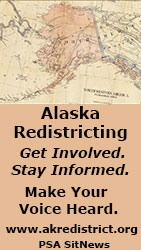
|
|
![]() Contact
Contact ![]()
![]() Webmail
Letters
Webmail
Letters![]()
![]() News Tips
News Tips![]()
![]() Copyright Info
Copyright Info![]() Archives
Archives![]() Alaska
Alaska![]() Ketchikan
Ketchikan![]() SE Alaska
SE Alaska![]() Dave Kiffer
Dave Kiffer![]() Money Matters
Money Matters ![]() June Allen
June Allen![]() Dave
Kiffer
Dave
Kiffer![]() Louise
B. Harrington
Louise
B. Harrington ![]() Ketchikan Links
Ketchikan Links![]() FAA Accident Reports
FAA Accident Reports ![]() NTSB
Accident Reports
NTSB
Accident Reports![]() Court Calendar
Court Calendar![]() Recent Filings & Case Dispositions
Recent Filings & Case Dispositions ![]() Court Records Search
Court Records Search![]() Sex Offender Reg.
Sex Offender Reg.![]() Public Notices
Public Notices![]() Alaska Recall Alerts
Alaska Recall Alerts![]() Recalls.gov
Recalls.gov![]() AST Daily Dispatch
AST Daily Dispatch![]() KTN
Police Reports
KTN
Police Reports![]() Juneau Police Reports
Juneau Police Reports ![]() Today's
Forecast
Today's
Forecast![]() KTN
Weather Data
KTN
Weather Data![]() AK
Weather Map
AK
Weather Map![]() AK Weathercams
AK Weathercams![]() AK Earthquakes
AK Earthquakes










































